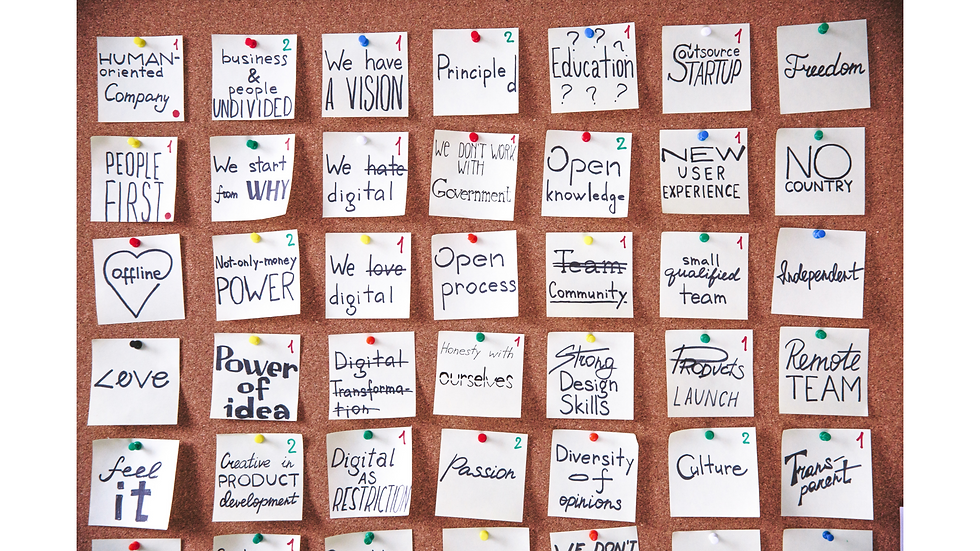Organisational Values and Stephen Covey’s 7 Habits of Highly Effective People
- Talent Academy

- Jun 25, 2021
- 4 min read
Updated: Nov 2, 2021
By Kar Lyn Ng, Marketing Intern at Talent Academy

Introduction
I recently listened to a super insightful podcast episode by Synergy IQ, featuring guest Mick O'Rourke. The episode delves into the essential building blocks needed to successfully grow your business, while also discussing the importance of developing seven habits that all successful people use.

This article is focused on the importance of having values and tiny habits to achieve success.
What are values?
One of the essential building blocks of a company is creating a set of shared values.
‘A system of shared values and norms that define appropriate attitudes and behaviour for organisational members’

Why do we need values?
‘Values are the fundamental fabric of the company’
Positive corporate culture starts with values. It is not something you create and ignore without adding any real value.
Having values is important because it helps:
Direct us to who we want to be
Understand the reason for us to do what we are doing
Make the right decisions
Guide attitudes, behaviours, and perceptions
Interpret what is right and wrong
Create harmony
Inspire and motivate us, and
Attract and retain the right people (not only the right talent but the right cultural fit!)
How do values align with your habits?
“Your beliefs become your thoughts, your thoughts become your words, your words become your actions, your actions become your habits, your habits become your values, and your values become your destiny.” - Mahatma Gandhi -
Tiny habits and values become big over time. Small changes can make a big impact on your business and on your own life as well.
The following are the 7 Habits of Highly Effective People by Stephen Covey, an American educator, author, businessman, and keynote speaker.

Habit #1: Be Proactive
Taking responsibility for your life without blaming external factors such as genetics, circumstances, or conditions for your behaviour. Proactive people focus on improving areas within their control, whereas reactive people focus on blaming uncontrollable factors.
“Reactive people are driven by feelings; proactive people are driven by values”
Habit #2: Begin with the End in Mind
Having personal leadership to effectively lead a company. If you know how to lead yourself, you know how to lead your team better.
Think about:
What is important to you?
Who is important to you?
What you want to be?
What you want to do?
What are your values?
“People are working harder than ever, but because they lack clarity and vision, they aren’t getting very far. They, in essence, are pushing a rope with all of their might.”

Habit #3: Put First Things First
Prioritizing commitments and putting the most important things first. Don’t overextend yourself by doing everything. It is okay if you are not doing everything. You have to learn to say no to things that don’t match the principles you value most and focus on achieving your top priorities.
“Learn to say NO when necessary”

Habit #4: Think Win-Win
A win-win situation is one where agreements or solutions are mutually beneficial with everyone feeling satisfied. It is not something we can achieve immediately. It is a character-based code for human interaction and collaboration. To become an individual who solves conflicts with a win-win attitude, you need to have integrity, maturity, and an abundance mentality.
“Win-win sees life as a cooperative arena, not a competitive one”.

Habit #5: Seek First to Understand, Then to Be Understood
As we grow older and become more successful, we tend to not listen to people. Relationship can be damaged if you don’t listen or acknowledge when someone is facing problems. By listening empathically, it provides you a clearer picture of reality. People open up quickly when you start listening to them effectively. This includes attentive, responsive, and active listening.
The next step is to make yourself understood. Through empathic listening, you will learn your listener’s paradigms and concerns. You can then communicate your ideas in the same language as your audience which increases clarity and credibility.
“Most people do not listen with the intent to understand; they listen with the intent to reply”.

Habit #6: Synergize
“Two heads are better than one”. It requires open-mindedness and creative cooperation to find new solutions to solve old problems. Greater results can be obtained by working together and contributing skills and expertise than working on it individually. We are more likely to discover things when we work together because the whole is greater than the sum of its parts.
“Synergy is better than my way or your way. It’s our way.”

Habit #7: Sharpen the Saw
Innovation is necessary in your life and your company because it helps you grow and continuously improve. It is crucial to boost your physical, mental, emotional, and spiritual health. You create growth and change by having a balanced program for self-renewal in these four areas. Moreover, having a concept for yourself and your company guides you to the right direction. We need to do the right things and consistently innovate to build a successful company in the long run.
“Renewal is the principle—and the process—that empowers us to move on an upward spiral of growth and change, of continuous improvement.”
Conclusion
It is important to have values and live by them as it forms the foundation of your business. Values dictates the direction that your business will take and how far your business will go in reaching success.
Stephen Covey’s seven habits of highly effective people is a good way to start building your values.
Out of these 7 habits, what habits do you think is important to you? What other habits and values would you add to that?
.png)



Comments